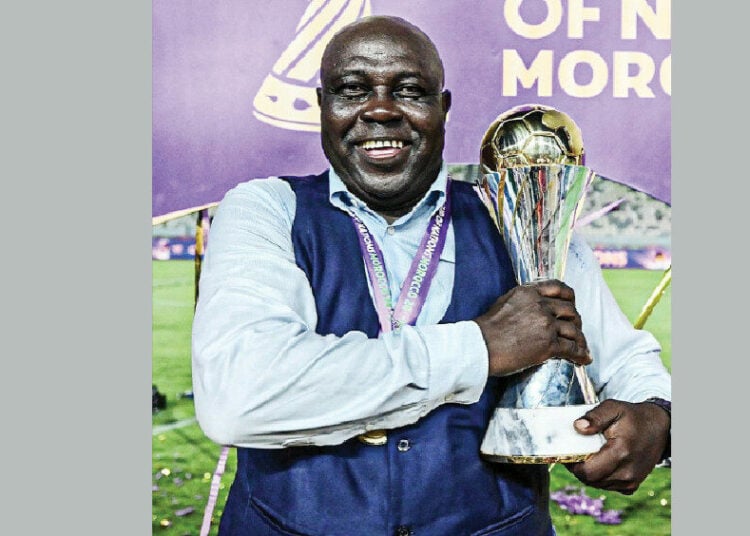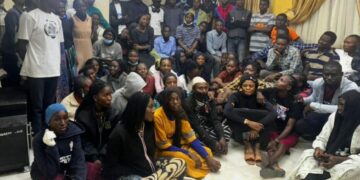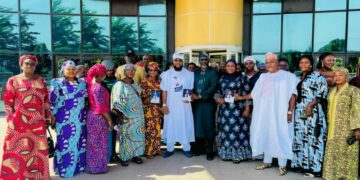He came without fanfare, led with focus, and gave Nigeria its sweetest football victory in years.
A Nigerian Coach, A Continental Triumph
When the Super Falcons stepped onto the pitch in Rabat, few imagined that a local coach — without a contract and without excuses — would lead them to rewrite African football history.
But Justine Madugu, quiet, tactical, and fiercely patriotic, did just that.
In a nail-biting 3–2 victory over host nation Morocco, the Falcons reclaimed their place as queens of African football, lifting their record-extending 10th CAF Women’s Africa Cup of Nations (WAFCON) title.
It wasn’t just a win; it was a statement — that Nigerian coaches can rise to global standards, and that homegrown competence still matters.
The Road Less Travelled
Madugu’s story is not one of overnight success but of slow, steady mastery. From his early coaching days with Adamawa United and the Nigeria national mini-football team, to serving as assistant coach through four WAFCON tournaments (2012, 2014, 2018, 2022), he built a reputation for discipline, tactical flexibility, and emotional intelligence.
When he took full charge of the Super Falcons in 2024, many doubted his ability to fill the shoes of foreign tacticians who had dominated the women’s game.
But Madugu stayed true to his roots — believing that leadership is less about accent and more about authenticity.
“We believed in ourselves,” he said after the final whistle.
“When Plan A wasn’t working, we switched to Plan B — and it worked.”
That humility, anchored in clarity of purpose, became his greatest weapon.
Masterclass in Strategy and Spirit
Facing Spain’s Jorge Vilda — the reigning FIFA Women’s World Cup-winning coach — in the WAFCON final, Madugu turned adversity into art.
Trailing 0–2 at halftime against Morocco’s Atlas Lionesses, he reorganised his midfield, unleashed a more aggressive pressing game, and inspired belief in a team many thought had peaked years ago.
The result: an astonishing comeback, a continental title, and redemption for indigenous coaching across Africa.
A Victory Beyond Football
For Nigeria, this triumph went deeper than silverware. It was a restoration of national pride, a reminder that excellence need not be imported.
In an era when foreign coaches often overshadow local talent, Madugu’s success restored confidence in Nigeria’s coaching bench — and reignited belief in the system’s capacity to nurture its own.
His approach was as much psychological as tactical. He fostered a sense of sisterhood among the players, grounding them in discipline, resilience, and collective purpose.
That team unity was evident on the field — every pass, every tackle, every goal radiated intent.
The Man Behind the Methods
Madugu is no stranger to challenge. When he returned to the national team in 2021, he did so quietly, focusing on results rather than rhetoric. Even without a formal contract from the Nigeria Football Federation (NFF), he chose service over status.
“It’s not a do-or-die thing,” he said modestly. “I’m just focused on delivering wherever I’m asked to serve.”
It is this understated professionalism — the refusal to let personal ambition eclipse collective progress — that makes his leadership remarkable.
Global Recognition
The world noticed. In 2025, Madugu was voted fourth in the Ballon d’Or Women’s Coach of the Year — ranking just behind England’s Sarina Wiegman, Chelsea’s Sonia Bompastor, and Arsenal’s Renée Slegers.
This recognition placed him among the top football minds on the planet, and for Nigeria, it was a victory of validation — proof that local expertise can thrive on global stages.
The Legacy of Belief
Madugu’s rise embodies the essence of Nigerian resilience: the ability to excel despite limited resources, uncertain support, and immense pressure.
He has become a beacon for young coaches across Africa, a living argument for investment in indigenous capacity.
Under his guidance, the Super Falcons didn’t just win; they inspired. They reminded a nation weary of cynicism that when discipline meets destiny, greatness follows.





